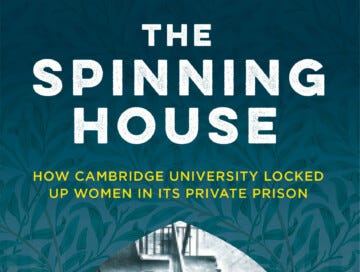The Spinning House: The Hidden History of Cambridge’s Private Women’s Prison
How Cambridge University Weaponised Morality to Punish Women"
The ingenious cruelty with which men have devised ways to punish and oppress women over centuries is both astounding and infuriating.
For over three centuries, Cambridge University wielded a 1561 charter to incarcerate thousands of young, working-class women—deemed "evil" or immoral, often under the assumption they were prostitutes, without evidence or trial. Many were arrested simple for walking with undergraduates after dark.
The University operated its own prison for women, known as the Spinning House. It was located in the heart of Cambridge and it was used from the 16th century until its closure in 1894.
It’s the old trick: let men off the hook while punishing women. Double standards like these stripped women of freedom and bolstered male privilege. By targeting working-class women highlights how class and gender oppression worked hand-in-hand, scapegoating marginalised women to keep the status quo. This abuse of power turned fear into a tool, perpetuating systemic inequality under the guise of morality.
It’s a common practice to absolve men of responsibility while punishing women. It shoes the double standards that restricted women's freedom and bolstered male privilege. By targeting working-class women, it highlights the intersection of class and gender oppression, scapegoating marginalised women to maintain societal norms. This abuse of power institutionalised fear and compliance, perpetuating systemic inequality under the guise of morality.
Variations of this dynamic persist today in different forms.
Women are often asked what they were wearing, if they were drinking, or why they were out late, while perpetrators of sexual assaults are not subjected to the same scrutiny.
Women are judged - often harshly - for their sexual choices, being labeled as promiscuous or immoral, while men engaging in the same behavior are excused or even celebrated.
At the workplace, women are criticised for being "too aggressive" or "too emotional" in leadership roles, while men exhibiting the same traits are praised as decisive or passionate.
In many countries, most recently exemplified by the United States, women are denied autonomy over their bodies, with laws criminalising abortion and punishing them for seeking reproductive care. Meanwhile, men face no legal or societal repercussions for their role in unwanted pregnancies.
These are just a few examples of pervasive gender inequalities.
As for the Cambridge, now, the historian Caroline Biggs with her book The Spinning House:How Cambridge University locked up women in its private prison, calls upon the university to confront this dark legacy and acknowledge the injustices inflicted upon these women.
Thank you for reading this Substack. If you think someone else might enjoy this too, please spread the word. If you have any feedback, please comment below.




